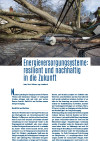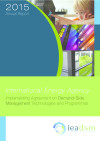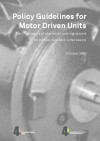Suchergebnisse
IEA ISGAN Working Group 5: Poster "Entwicklung und Evaluierung von Open-Source-Testskripten für die europäische DER-Prüfnorm EN50549-10" (2022)

Im Rahmen der Arbeit wurden Open-Source-Testskripte für den Test von verteilten Energieressourcen (DER) auf Basis der europäischen DER-Prüfnorm EN50549-10 entwickelt und validiert.
Fouad Jose Salazar Hamze, Roland Bruendlinger, Ricardo Guerrero Lemus
Herausgeber: IEA ISGAN Working Group 5, 2022
Englisch, 1 Seiten
Downloads zur Publikation
Artikel in der Zeitschrift "nachhaltige technologien" Ausgabe 2018-3: Energieversorgungssysteme: resilient und nachhaltig in die Zukunft

Nachdem jahrelang die Themen Effizienz und erneuerbare Energien im Vordergrund standen, erlangen mehr und mehr zwei weitere Themen Gewicht: Flexibilität und Resilienz unserer Energieversorgung.
Anna Maria Fulterer, Ingo Leusbrock
Herausgeber: AEE - Dachverband
Deutsch, (nachhaltige technologien 2018-3, Seite 22) 3 Seiten
Downloads zur Publikation
IEA EBC Annex 68: Particle filtration in energy efficient housing with MVHR (mechanical ventilation with heat recovery) (2020)

Sehr energieeffiziente Gebäude sind sehr luftdicht und bedingen meist den Einsatz einer Komfortlüftung. Die Studie geht der Frage nach welche Luftfilterklasse für die Filtrierung der Zuluft sinnvoll ist, wenn man auch innere Partikelquellen berücksichtig.
G. Rojas
Herausgeber: REHVA Journal
Englisch, 4 Seiten
Intelligent Efficiency: A case study of barriers and solutions - Smart Homes

Diese Fallstudie untersucht Barrieren und Lösungen im Zusammenhang mit intelligentem Wohnen (Smart Homes) als Folgeanalyse der 2017 EDNA Studie "Inteligent Efficiency - Policy Opportunities". Intelligente Effizienz (IE) ist der Einsatz von netzwerkverbundenen IKT-Technologien auf Systemebene, um den effizienten Betrieb von energiebetriebenen Geräten zu ermöglichen und somit Energie einzusparen.
Herausgeber: EA - 4E EDNA
Englisch, 55 Seiten
Downloads zur Publikation
CEM12: Policy Messages from the ISGAN Regulatory Sandbox 2.0 Project
04. June 2021
On demand side event, CL
This recorded event shares the key findings from an international deep-dive knowledge exchange within the International Smart Grid Action Network (ISGAN) on the topic of Regulatory Experimenting, such as Regulatory Sandboxes, that can be used as levers to accelerate the energy transition.
Empowering Efficiency: A Policy Perspective on Data Centres
15. February 2024
Online
This webinar of the IEA and the IEA-4E Efficient Demand Flexible Networks Annex (EDNA) aims to provide policy makers with information and evidence-based recommendations for measures to improve the energy efficiency of Data centres, including the impact and suggestions for their implementation, presented in a new report titled "Policy Development on Energy Efficiency of Data Centres".
Die Marktentwicklung der Solar- und Wärmepumpentechnik in Österreich

Schriftenreihe
03/1999
G. Faninger
Deutsch
Jahresbericht 2013 des IEA Demand Side Management Programms (DSM)

Der Jahresbericht 2013 bietet einen Überblick über die Aktivitäten und Ergebnisse des vergangenen Jahres, die DSM Prioritäten in den teilnehmenden Ländern sowie über die aktuell laufenden Forschungsprojekte.
IEA-DSM Annual Report 2014

Der Jahresbericht gibt einen Rückblick über die Aktivitäten und Highlights im Jahr 2014.
Die Marktentwicklung der Solar- und Wärmepumpentechnik in Österreich

Schriftenreihe
16/1997
G. Faninger
Deutsch
Jahresbericht 2015 des IEA Demand Side Management Programms (DSM)

Die Inhalte des Jahresberichts 2015 umfassen neben den Statusbeschreibungen der aktuellen Tasks (Task 16, 17, 24 und 25) die derzeitigen Prioritäten des DSM generell und in den teilnehmenden Ländern.
Anne Bengtson
Herausgeber: IEA Demand Side Management Programme
Englisch, 110 Seiten
Downloads zur Publikation
IEA DSM Task 17: Valuation Analysis of Residential Demand Side Flexibility (2016)

In diesem Bericht werden die Änderungen und Auswirkungen auf den Netzbetrieb und Energiemarkt analysiert. Geschäftsmodelle und Anwendungsfälle sowie Koordinationskonzepte und zukünftige Marktgestaltungen werden beschrieben. Er beinhaltet auch eine Gegenüberstellung von Kosten-Nutzen (cost-benefit) Bewertungsmethoden.
Herausgeber: IEA-DSM Task 17
Englisch, 96 Seiten
Downloads zur Publikation
Policy Guidelines for Motor Driven Units (MDUs) Part 1

Dieser Leitfaden untersucht die Möglichkeiten zur weltweiten Harmonisierung von Normen und Gesetzen, die die Energieeffizienz von Motorsystemen betreffen.
M. Werkhoven, R. Brunner, C. Werle
Herausgeber: Electric Motor Systems Annex
Englisch, 74 Seiten
Downloads zur Publikation
IEA-DSM Spotlight Newsletter 56, March 2015

Der allgemeine Newsletter des IEA DSM Programms
Pamela Murphy
Herausgeber: IEA Demand Side Management Programme
Englisch
Downloads zur Publikation
IEA DSM Task 17: The Roles and Potentials of Flexible Consumers and Prosumers (2016)

Dieser Bericht ist der erste in einer Serie und beschreibt neue Rollen und Akteure im Energiesystem, um Wertschöpfung für flexible Verbraucher zu ermöglichen. Technologien zum Einsatz von Flexibilität und technische Potentiale von verteilten und flexiblen Verbrauchern sind ebenfalls Inhalt.
Herausgeber: IEA-DSM Task 17
Englisch, 84 Seiten
Downloads zur Publikation
IEA EBC Annex 56: Evaluation of the impact and relevance of different energy related renovation measures on selected Case Studies (2017)

Der Bericht beinhaltet die Recherche und Analyse der im IEA EBC Annex 56 untersuchten Gebäudesanierungen und den Vergleich mit den generischen Berechnungen des jeweiligen Landes.
David Venus, Karl Höfler, Manuela Almeida, Marco Ferreira, Ana Rodrigues, Roman Bolliger, Walter Ott, Ove C. Mørck and Iben Østergaard
Herausgeber: IEA EBC Annex 56
Englisch, 107 Seiten
Downloads zur Publikation
IEA Users TCP: Paper "Social license to automate: A critical review of emerging approaches to electricity demand management" (2021)

Im Journal Energy Research & Social Science wurde eine Literaturanalyse zu Sozialer Akzeptanz von automatisiertem Demand Side Management veröffentlicht, in der die Eignung der Anwendung des „Social License“ Konzepts überprüft wird und zentrale Themen herausgearbeitet werden.
Adams, S., Kuch, D., Diamond, L., Fröhlich, P., Henriksen, I. M., Katzeff, C., Ryghaug, M. and Yilmaz, S.
Herausgeber: Elsevier - Energy Research & Social Science Vol. 80
Englisch, 12 Seiten
IEA AFC Annex 33: The implementation of European Directives and Regulations: Opportunities or threats for fuel cell systems (2017)

Der Bericht bietet einen Überblick über Chancen und Risiken, welche diverse Richtlinien (meist EU-Richtlinien) bezogen auf die Marktdurchdringung von stationären Brennstoffzellen mit sich bringen können. Verbesserungsvorschläge wurden ausgearbeitet. Neben der Analyse der gesetzlichen Rahmenbedingungen sind auch die Preisunterschiede der stationären Brennstoffzellen zwischen Japan und der EU im Bericht dargestellt.
Simader G., Schuch A. & Presch D.
Englisch, 90 Seiten
IEA 4E Policy Brief zu Intelligenter Effizienz: Smart Homes (2018)

Der Policy Brief fasst die wichtigsten Ergebnisse des EDNA Reports "Intelligente Effizienz - Eine Fallstudie zu Barrieren und Lösungen - Smart Homes" zusammen. In dieser Fallstudie verwenden Smart Homes Netzwerkkonnektivität zum Verwalten und Automatisieren von Prozessen wie Beleuchtung, Heizen / Kühlen und Waschen, um den Energieverbrauch und die Betriebskosten zu senken.
Herausgeber: IEA 4E
Englisch, 2 Seiten
Downloads zur Publikation
IEA SHC Task 61, EBC Annex 77: Modeling the direct sun component in buildings using matrix algebraic approaches (2018)

In diesem Artikel werden Methoden beschrieben und validiert, welche die Berechnung des direkten Sonnenanteils der Tagesbelichtung in Innenräumen effizient und korrekt ermöglichen.
Eleanor S. Lee, David Geisler-Moroder, Gregory Ward
Herausgeber: Solar Energy Vol. 160
Englisch, 16 Seiten
